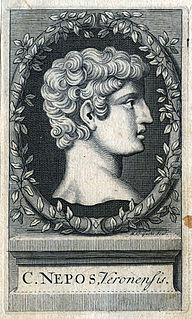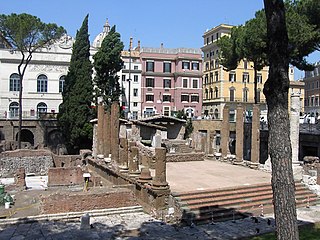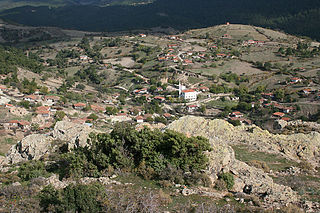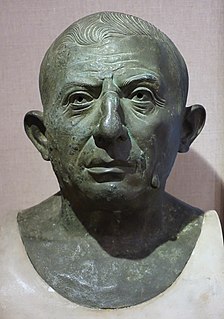Related Research Articles

The 1st century BC, also known as the last century BC and the last century BCE, started on the first day of 100 BC and ended on the last day of 1 BC. The AD/BC notation does not use a year zero; however, astronomical year numbering does use a zero, as well as a minus sign, so "2 BC" is equal to "year –1". 1st century AD follows.
80s BC is the time period from 89 BC – 80 BC.

Classical Latin is the form of Literary Latin recognized as a literary standard by writers of the late Roman Republic and early Roman Empire. It was used from 75 BC to the 3rd century AD, when it developed into Late Latin. In some later periods, it was regarded as good or proper Latin, with following versions viewed as debased, degenerate, or corrupted. The word Latin is now understood by default to mean "Classical Latin"; for example, modern Latin textbooks almost exclusively teach Classical Latin.

Lucius Cornelius Sulla Felix, commonly known as Sulla, was a Roman general and statesman. He won the first large-scale civil war in Roman history and became the first man of the Republic to seize power through force.

Cornelius Nepos was a Roman biographer. He was born at Hostilia, a village in Cisalpine Gaul not far from Verona.

Valerius Antias was an ancient Roman annalist whom Livy mentions as a source. No complete works of his survive but from the sixty-five fragments said to be his in the works of other authors it has been deduced that he wrote a chronicle of ancient Rome in at least seventy-five books. The latest dateable event in the fragments is mention of the heirs of the orator, Lucius Licinius Crassus, who died in 91 BC. Of the seventy references to Antias in classical literature sixty-one mention him as an authority on Roman legendary history.
Lucius Cornelius Sisenna was a Roman soldier, historian, and annalist.

The gens Pompeia was a plebeian family at ancient Rome, first appearing in history during the second century BC, and frequently occupying the highest offices of the Roman state from then until imperial times. The first of the Pompeii to obtain the consulship was Quintus Pompeius in 141 BC, but by far the most illustrious of the gens was Gnaeus Pompeius, surnamed Magnus, a distinguished general under the dictator Sulla, who became a member of the First Triumvirate, together with Caesar and Crassus. After the death of Crassus, the rivalry between Caesar and Pompeius led to the Civil War, one of the defining events of the final years of the Roman Republic.
Faustus Cornelius Sulla was a Roman senator. Faustus was the only surviving son of the Roman Dictator Lucius Cornelius Sulla and his fourth wife, Caecilia Metella, and thus was a member of one of the most ancient patrician families, the Cornelii. After his father's death in 78 BC, he and his twin sister, Fausta, were brought up by his guardian and father's friend, Lucullus.

The gens Cornelia was one of the greatest patrician houses at ancient Rome. For more than seven hundred years, from the early decades of the Republic to the third century AD, the Cornelii produced more eminent statesmen and generals than any other gens. At least seventy-five consuls under the Republic were members of this family, beginning with Servius Cornelius Maluginensis in 485 BC. Together with the Aemilii, Claudii, Fabii, Manlii, and Valerii, the Cornelii were almost certainly numbered among the gentes maiores, the most important and powerful families of Rome, who for centuries dominated the Republican magistracies. All of the major branches of the Cornelian gens were patrician, but there were also plebeian Cornelii, at least some of whom were descended from freedmen.

Aurelia was the mother of the Roman general and statesman Julius Caesar.

Cornelia was the first or second wife of Julius Caesar, and the mother of his only legitimate child, Julia. A daughter of Lucius Cornelius Cinna, Cornelia was related by birth or marriage to many of the most influential figures of the late Republic.

The gens Lutatia, occasionally written Luctatia, was a plebeian family of ancient Rome. The first of the gens to obtain the consulship was Gaius Lutatius Catulus in 242 BC, the final year of the First Punic War. Orosius mentions their burial place, the sepulchrum Lutatiorum, which lay beyond the Tiber.

Scepsis or Skepsis was an ancient settlement in the Troad, Asia Minor that is at the present site of the village of Kurşunlutepe, near the town of Bayramiç in Turkey. The settlement is notable for being the location where the famous library of Aristotle was kept before being moved to Pergamum and Alexandria. It was also home to Metrodorus of Scepsis and Demetrius of Scepsis.
Gnaeus Cornelius Dolabella was a consul of the Roman Republic in 81 BC, with Marcus Tullius Decula, during the dictatorship of Sulla.

The gens Caecilia was a plebeian family at ancient Rome. Members of this gens are mentioned in history as early as the fifth century BC, but the first of the Caecilii who obtained the consulship was Lucius Caecilius Metellus Denter, in 284 BC. The Caecilii Metelli were one of the most powerful families of the late Republic, from the decades before the First Punic War down to the time of Augustus.
The early career of Julius Caesar was characterized by military adventurism and political persecution. Julius Caesar was born on July 12 or 13, 100 BC, Subura in Rome into a patrician family, the gens Julia, which claimed descent from Iulus, son of the legendary Trojan prince Aeneas, supposedly the son of the goddess Venus. His father died when he was just 16, leaving Caesar as the head of the household. His family status put him at odds with the Dictator Lucius Cornelius Sulla, who almost had him executed.

The siege of Athens and Piraeus was a siege of the First Mithridatic War that took place from Autumn of 87 BC to the Spring and Summer of 86 BC. The battle was fought between the forces of the Roman Republic, commanded by Lucius Cornelius Sulla Felix on the one hand, and the forces of the Kingdom of Pontus and the Athenian City-State on the other. The Greek Pontian forces were commanded by Aristion and Archelaus.
Arthur Peter Keaveney was an Irish historian.
Quintus Caecilius Epirota was a freeman of Atticus, a grammarian, and the first person to initiate the public teaching of Virgil’s poetry.
References
- 1 2 Adams, Sean A. (2019). Scholastic Culture in the Hellenistic and Roman Eras. Walter de Gruyter GmbH & Co KG. pp. 135–136. ISBN 9783110660982 . Retrieved June 14, 2020.
- ↑ Suetonius; Rolfe, C.J. (tr) (1914). On Grammarians. Loeb Classical Library. p. 12.1. Retrieved June 14, 2020.